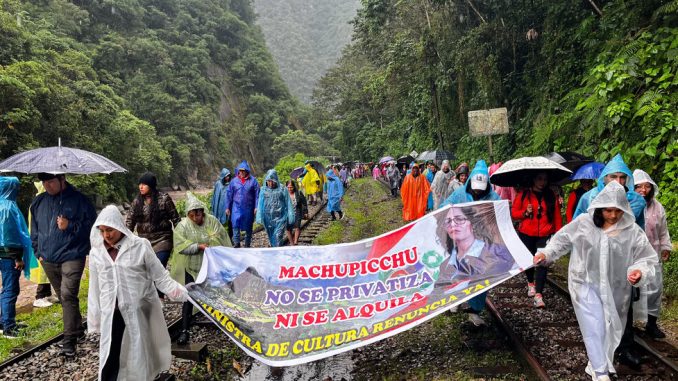
Hundreds of tourists were stranded near Machu Picchu, Peru’s most-visited site, over the weekend after demonstrators blocked railway and bus routes to the site and shut down local shops and restaurants in Aguas Calientes, the gateway to Machu Picchu, in the country’s Cuzco region. Some visitors posted videos on social media pleading for help. The police evacuated about 700 tourists on Saturday. Many left without seeing the site.
The protesters had taken to the streets on Thursday to demand the government rescind a contract that allows a company to sell tickets to Machu Picchu for the first time. Tickets had previously been sold through the office of culture in Cuzco, which is controlled by the regional government.
Protesters agreed to a 24-hour “truce” on Tuesday to take part in talks with government officials. While Machu Picchu is officially open, train service to Aguas Calientes and buses that take tourists to the citadel remain suspended. The U.S. Embassy advised travelers who want to try to reach the site by other means to make sure they take enough food and any medicine they might need.
Machu Picchu, believed to be a 15th-century getaway for Incan royalty, received some 2.2 million visitors last year, below prepandemic levels of 4.6 million. Peru has been trying to encourage tourists to visit other ancient sites in part to prevent overcrowding, which UNESCO has warned could damage parts of its structure.
Who is protesting and why are they angry?
Protesters include tour operators, guides, activists and residents in the region of Cuzco. They are opposed to a private company profiting from sales of tickets to Machu Picchu and claim that the company, Joinnus, an events marketing platform, was chosen to administer the sales last year through a corrupt deal with the culture minister, Leslie Urteaga, which she denies.
Elvis La Torre, the mayor of Aguas Calientes, said that the government did not consult local authorities or residents about the new online system.
Distrust of the government of President Dina Boluarte runs deep in Cuzco, a heavily Indigenous region with countless pre-Columbian ruins. Ms. Boluarte took office in late 2022 after her predecessor was ousted and arrested after trying to dissolve the Peruvian Congress, prompting widespread nationwide protests that she responded to with crackdowns that left 49 civilians dead, mainly in Indigenous regions.
What is the government trying to do?
The government says the new ticketing system aims to make sales more transparent. It alleges that “mafias” with ties to the regional government of Cuzco divert a portion of tickets to sell them on the black market, depriving public coffers of revenue and making it harder to measure the true number of visitors to the site.
The government is also trying to implement a “dynamic” system where the daily limit on visitors changes throughout the year.
The company that buses tourists to Machu Picchu routinely reports higher numbers of tourists per day than the official ticket sales, according to the tourism commission in Congress. The national comptroller’s office found that over 2021 and 2022, 70,000 to 80,000 visitors to Machu Picchu had not been counted by the regional culture office, representing a loss of about $2 million per year.
Where do the negotiations stand now?
Protesters want the culture minister to resign and the contract with Joinnus to be rescinded. On Tuesday, the culture ministry announced that it would move the new ticketing system to a platform administered by the central government, with input from the regional government of Cuzco.
Ms. Urteaga said it would take “a prudent period of time” to transition to a new, state-run system. “We cannot return to the previous system,” she said on X, formerly Twitter. We must have a secure, transparent and objective platform.”
Joinnus said it would agree to end its contract early.
Mr. La Torre, the mayor, proposed updating the regional government’s online platform for selling tickets to ensure transparency. “We’ll agree to modernizing the system of sales of the culture ministry,” he said in a video posted online, but only if the process was “transparent” and “communicated to stakeholders.”
It was not clear if demonstrators would resume their protest after the truce ends at midnight on Tuesday.
Hasn’t this happened before?
Peru is rife with social conflicts, and it is not unusual for residents in rural regions to block roads to draw media attention to their demands and pressure authorities to negotiate.
In the past decade, protesters have blocked railway access to Machu Picchu several times as part of efforts to secure higher salaries for teachers and health workers, lower fares for rail service, or assistance for farmers during an acute fertilizer shortage.
In late 2022 and early last year, tourism in much of southern Peru, including Machu Picchu, halted for several weeks during political unrest after Ms. Boluarte took office.
Follow New York Times Travel on Instagram and sign up for our weekly Travel Dispatch newsletter to get expert tips on traveling smarter and inspiration for your next vacation. Dreaming up a future getaway or just armchair traveling? Check out our 52 Places to Go in 2024.


Be the first to comment